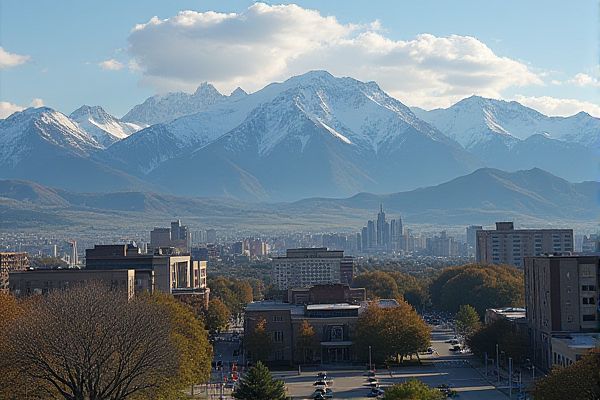
Emergency services and contact information in Montana: Dial 911 for emergencies. Montana State Emergency Coordination Center. Local police department contact. Fire department contact numbers. Ambulance services contact. Poison Control Center hotline. Roadside assistance contact. Local hospital emergency departments. Montana Disaster and Emergency Services Division. Non-emergency police line numbers.
Dial 911 for emergencies.
In Montana, dialing 911 is crucial for obtaining an immediate response from fire, police, or ambulance services during emergency situations, whether you are witnessing smoke or flames, require medical assistance, or notice suspicious activity. It is important to reserve the use of 911 for emergencies and avoid calling for non-urgent matters such as reporting utility outages, asking for directions, or seeking general information. For more detailed guidance on when to make the call, the City of Missoula website offers comprehensive insights on the appropriate use of 911 services. This ensures that emergency resources remain available for those in critical need.
Montana State Emergency Coordination Center.
The Montana State Emergency Coordination Center (SECC), managed by the Montana Disaster & Emergency Services, operates under the NIMS/ICS model and coordinates state-level responses to incidents, emergencies, and disasters. It provides support through resource deployment, incident management, and situational awareness updates. For more information, visit the Montana Disaster & Emergency Services website. The SECC can be contacted through the 24-hour Duty Officer Program for immediate assistance.
Local police department contact.
For emergency services in Laurel, Montana, you should immediately contact the Laurel Police Department dispatch or simply dial 911. For non-emergencies, there are alternative means of communication available; you can reach out via phone or fax, with the assurance of service availability around the clock. For more detailed information, you can visit the Laurel Police Department website.
Fire department contact numbers.
This website offers a comprehensive directory of fire departments in Montana, featuring contact numbers, addresses, and directions for various departments across the state. For specific departments such as Big Sky, Montana City, or Missoula, you can also refer to their individual websites for detailed contact information.
Ambulance services contact.
St. Peter's Health Ambulance Service provides 24-hour 911 services for Lewis and Clark County, offering Advanced Life Support at the paramedic level. In the event of an emergency, residents are advised to call 911. For additional event requests or other inquiries, individuals can reach out through the St. Peter's Health website or contact them directly.
Poison Control Center hotline.
In Montana, the Poison Control Center hotline is 1-800-222-1222, which connects callers to the Rocky Mountain Poison and Drug Center or the nearest Poison Help Center, providing 24/7 expert advice and treatment guidance for poisoning emergencies.
Roadside assistance contact.
When you find yourself in need of roadside assistance in Montana, utilizing the AAA Digital Roadside Request online tool is an efficient solution. You can also text HELP to 800-AAA-HELP or call (800) AAA-HELP to request service. Make sure to provide crucial details such as your membership number, vehicle location, and the specific type of service you require. Whether it's a flat tire, jump start, or towing, AAA offers reliable support to ensure you're back on the road in no time.
Local hospital emergency departments.
In Montana, residents and visitors have access to exceptional emergency care through facilities like St. Luke Community Hospital's Emergency Department in Ronan and the Community Medical Center in Missoula. Both centers are designated trauma receiving facilities, committed to providing critical care with a team of board-certified physicians and specially trained trauma nurses available 24/7. The St. Luke Community Hospital features separate waiting areas, trauma bays, and decontamination rooms, ensuring patients receive prompt and specialized attention. Meanwhile, the Community Medical Center serves as a regional referral hub with amenities such as private exam rooms and a helipad for air transport, catering to the broader needs of Western Montana. Together, these facilities uphold a high standard of emergency medical services, vital for timely and effective patient care.
Montana Disaster and Emergency Services Division.
The Montana Disaster and Emergency Services (MT DES) serves as the primary agency for comprehensive emergency management in Montana, playing a crucial role in coordinating preparation, response, and recovery efforts. Situated at 1956 Mt. Majo Street, Fort Harrison, MT 59636-4789, MT DES acts as a vital link for emergency operations across the state. For more detailed information on their services and initiatives, you can visit the official Montana Disaster and Emergency Services website. For general questions, they can also be reached via email at mtdes@mt.gov.
Non-emergency police line numbers.
In Montana, it's essential to know when and how to contact the appropriate authorities for non-emergency situations. For instance, residents should be aware of specific non-emergency numbers like the Bozeman Police Department's line or the Gallatin County Sheriff's Office contact. Similar options are available across different regions including Helena-Lewis & Clark County and the Great Falls Police Department. For more detailed guidance on when to utilize these services, you may refer to the official Gallatin County Dispatch Center FAQ which provides comprehensive information on making informed decisions about non-emergency calls.
